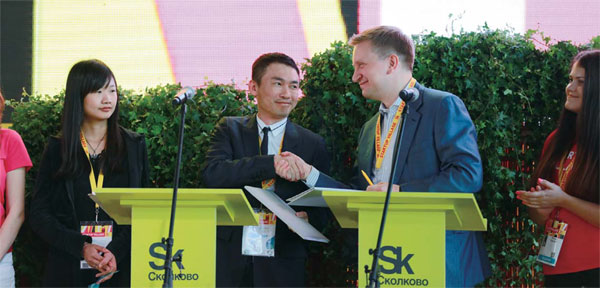Nanoplus deal to exploit Russian tech

Cooperation nurtured by Beijing and Moscow is paying off in a big way for a high-tech company
China's small and medium-sized manufacturers have been looking for ways other than the well-trod paths of overseas exhibitions and startup competitions to attract business in Russia.
Nanoplus Tech, a company from Kunshan city in Jiangsu province, decided to build a research and development center with its Russian partners this year in Moscow's new high-tech park.
| Jasber Lu (center), president of Nanoplus Tech, shakes hands with Ogor Karavaev, vice-president of Skolkovo Foundation, after signing their agreement. Ren Qi / China Daily |
The company signed an agreement with Skolkovo Innovation Center, known as the Silicon Valley of Russia, to find ways to commercialize the advanced theories from Russian academic research on nanometer materials.
Nanoplus Tech was started in 2007 and specializes in nanometer materials as well as glass manufacturing, polishing and cutting. A nanometer is a tiny metric unit equal to one-billionth of a meter. One of the key products of Nanoplus Tech is a kind of industrial cleaning product to clean polished metal parts of the iPhone without any pollution or harm to human health.
The company is a subsidiary of Foxconn Group, one of the largest contract electronics manufacturers in the world and producer of most Apple mobile products.
Jasber Lu, president of Nanoplus Tech, says while made-in-China products used to mean they were cheap, the company is showing that it can turn theories into applied science and high-tech products.
Both the Russian and Chinese governments have encouraged this type of cooperation.
Chinese Vice-Premier Zhang Gaoli suggested such links between the two countries in May, stressing the importance of companies' using research and innovation to boost development.
Lu praises such encouragement, noting Russia's world-leading research in nanometer materials. He says that by working with Russian scientific institutions and professors at Moscow State Technical University, Nanoplus Tech is able to manufacture iPhone and iPad parts such as buttons and back plates with nanoscale waterproof paint, so that the parts are several times more water-resistant than before.
This cooperation has been boosted by the Russian government's creation in 2010 of the nonprofit Skolkovo Foundation, which has meant to accelerate the country's economic transformation from resource-intensive to innovation-based.
The foundation is overseeing the creation of the Skolkovo Innovation Center, located near Moscow and composed of 1,200 high-tech startups; Skolkovo Technopark; the Skolkovo Institute of Technology, a new graduate research university established in collaboration with the Massachusetts Institute of Technology; and Skolkovo city.
Nanoplus Tech is not the first Chinese organization to play a role at Skolkovo. In 2015, officials from the Tsinghua University Science Park based in Beijing, and others from three Chinese startups, went to Moscow for the Skolkovo Startup Competition. The annual competition attracts startups from all over the world to vie for a top prize of over $20,000.
But the R&D center is considered a much more significant step for Skolkovo and its Chinese partner.
Ogor Karavaev, vice-president of the Skolkovo Foundation, says it signed its first such agreement with Nanoplus Tech, making it very important. "We were seeking cooperation with Chinese medium-sized companies, because they are more mature than startups, and make quicker decisions to open new offices in Russia than big companies.
"In Skolkovo village, there are already some high-tech startups, and our new partner from Kunshan is famous for its glass polishing and nanometer material manufacturing. Therefore I think this cooperation is a perfect example of how small and medium-sized companies from the two countries can cooperate."
Boris Titov, Russian chairman of the China-Russia Friendship Committee for Peace and Development, says the bilateral cooperation of small and medium-sized companies is extremely important because they produce products and services for daily use and are representative of their country's economy.
"At present, there are 70 million such companies in China but only 5 million in Russia, but we can see the vast potential for cooperation and their development," Titov says.
renqi@chinadaily.com.cn
(China Daily European Weekly 07/15/2016 page30)
Today's Top News
- Chinese landmark trade corridor handles over 5m TEUs
- China holds first national civil service exam since raising eligibility age cap
- Xi's article on CPC self-reform to be published
- Xi stresses improving long-term mechanisms for cyberspace governance
- Experts share ideas on advancing human rights
- Japan PM's remarks on Taiwan send severely wrong signal































